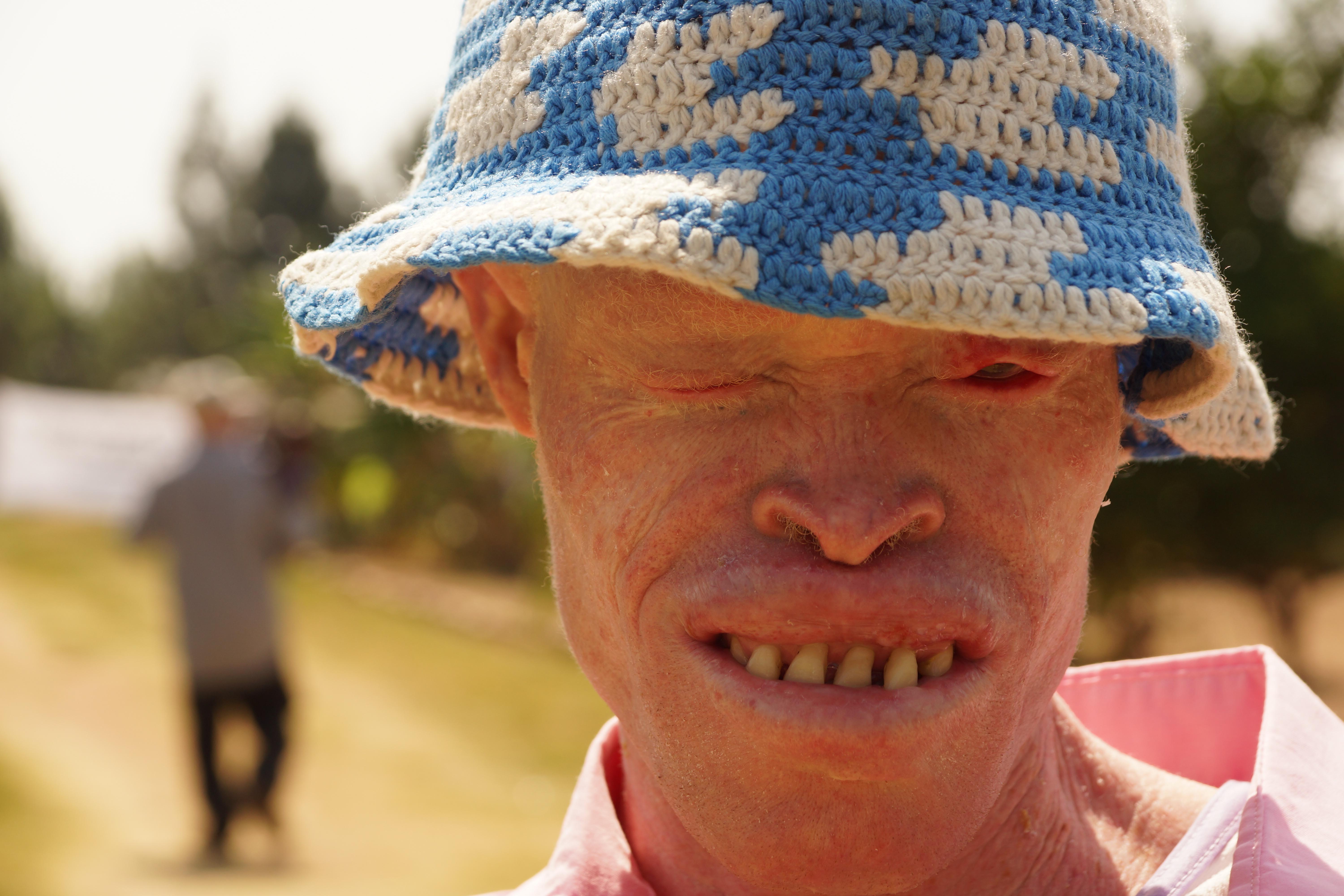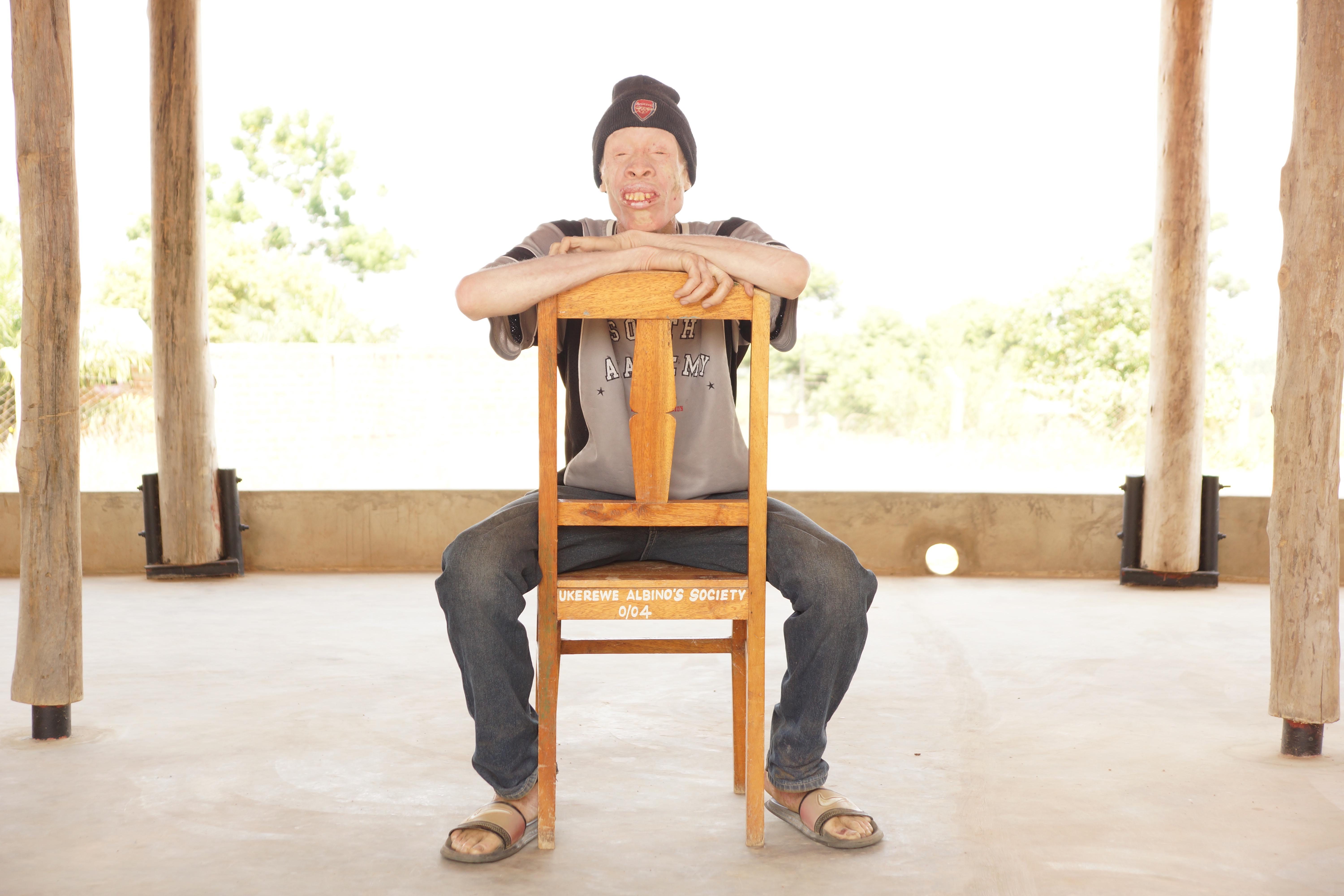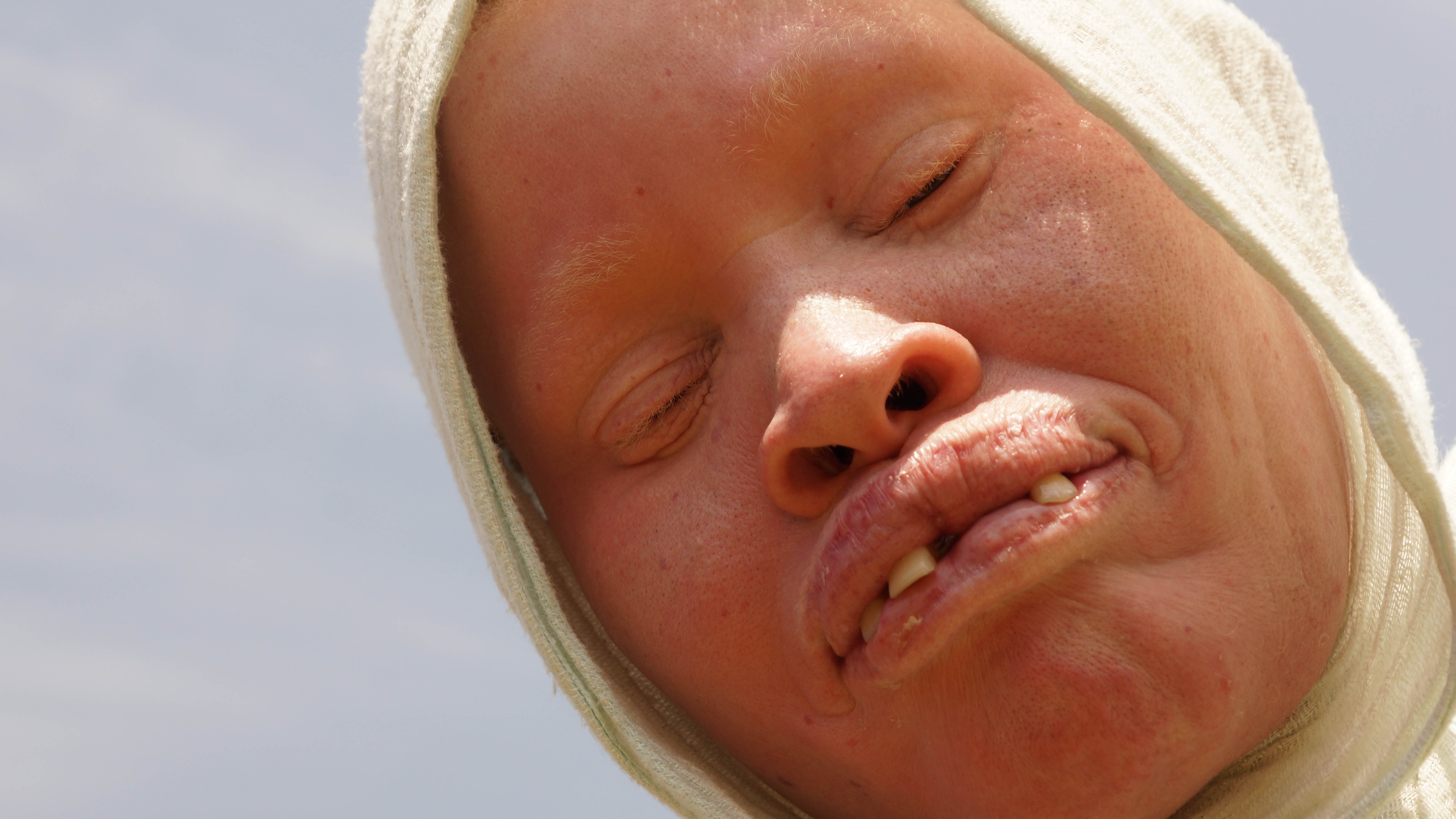My parents abandoned me, because I look the way I do.
They said I’m not their child—
that I belong to the whites.
“Maishe Yangu” (“My Life”), by Hamidu Didas
Imagine being hunted for your own body parts with the palpable potential of being mutilated while still alive. Envision that due to a genetic condition—one that’s already life-threatening due to the high incidence of skin cancer—that you are so feared that you’re denied food or water for fear of your contaminating it. Or that you live with the experience of having been abandoned at birth by one or both parents simply for the color of your skin, and having been threatened with murder because of it by family members. How perpetually unsettling must it be to walk amidst a population that subsists on an average of $7.32 a day, but has been misled by rumors to believe that your corpse is worth more than $75,000? What is a lifetime of being shadowed by whispers and side glances when you pass? And, if you are a woman, to be burdened additionally with the even more likely horror of rape due to a prevalent myth that having intercourse with a woman with albinism can cure AIDS—rapes that almost insure that in addition to the trauma of the sexual assault itself, there is also the very real possibility of contracting the AIDS virus as a result.
For the past decade, I and my wife, Marilena Delli—who is Italian-Rwandan and does all of the photos and video for our projects—have been seeking out performers from under-represented regions, which unfortunately comprises the majority of countries on the planet. We are especially motivated to try to provide a platform for those who are censored or persecuted within their own culture. We have worked with amazing artists in Rwanda, Malawi (currently the world’s number one poorest nation), South Sudan, Algeria, Romania, Nairobi, Cambodia, Vietnam, and other countries.
Marilena and I were fortunate enough to partner with the wonderful StandingVoice.org charity from the UK, and they helped us connect with the albinism community in northern Tanzania. And when they suggested the Ukerewe Island as a possibility, we knew that despite its remoteness making it logistically even more difficult and daunting than the journey already was, that there basically was no choice but to go there and focus on that local population, since the individuals on the island were likely to be even more under-heard than those with albinism on the mainland.

In fact, in the time since the recording, it has turned out that no one so far that I’ve talked to—even news bureau directors covering the southern or eastern African regions—was previously aware of the island’s existence. This is a concrete reflection of just how off the map and forgotten the island is.
No one on the record had ever written songs or played instruments before, except for one man who appears on just one song that is a minute long. In fact, we were very dismayed to learn that many of the collective members had been discouraged from singing even in church, that one scared space where people historically over the ages have been allowed to express themselves—even in times of slavery! Some of these individuals from the albinism community had been denied even that most rudimentary level of freedom.
The Tanzania Albinism Collective endeavor was similar in goal to our Grammy-nominated Zomba Prison Project, in which we insisted on being able to work with the female prisoners who had no instruments and did not consider themselves songwriters. Nonetheless, the women at Zomba Prison ended up contributing over half of the songs to the final album (though they make up less than 1% of the total prison population).
In the case of the Tanzania Albinism Collective, StandingVoice.org conducted outreach to the community and a core group of eighteen people volunteered. They met weekly to prepare for our arrival and we sent some instruments ahead for them to have and use. What we did not anticipate was that during that entire period of weekly meetings, they never touched any of the instruments due to revering them too highly. So the first thing that we did upon discovering this when we arrived was to take all of the instruments out of their packaging, break and rough them up a bit, and have every single person involved touch the instruments—bang, strum, swat, and pluck them, trying to demystify these tools.
The only direction that we gave was for them to write about whatever they wanted the world to know about their life.
We asked everyone involved to write at least one song as a condition of their participation. In exchange, we provided a modest fee and a meal each day. The agreement was that one person a night would volunteer to take each of the instruments home, but only if they were fully committed to returning the next day with at least one new song—and hopefully more. Not surprisingly, those that were the most eager and volunteered more than once to take instruments with them overnight wrote more songs. And even less surprisingly, the songs that they composed got better with each passing day of effort. We recorded around twenty hours of music in total and the bulk of that which comprises the album came from the final days, during which the collective had made so much progress as writers and gained greater confidence in their voices, despite having been at it for less than two weeks’ time.
The only direction that we gave was for them to write about whatever they wanted the world to know about their life. Also, as always with any writing exercise, the encouragement was to be specific and not generalize. We also assured them that if they were more comfortable singing in the local dialects of Jeeta and Kikerewe, that could be quite special.
The important thing was that they had the liberty to express whatever they wanted to and in whatever manner that they desired. There were no limitations, only encouragement. Not surprisingly, themes of loneliness, fear, and dismay emerged in the work—“I Am a Human Being,” “They Gossiped When I Was Born,” “Life is Hard,” and “Who Can We Run To?” are just a few examples.

The bulk of the instrumentation is comprised of “found instruments” from the immediate rural environment—a sledgehammer, a beer bottle and rusty nail, a bow and arrow, a straw broom, a frying pan, school table-tops, a cracked plastic rainwater basin that stands over six feet high, and so on.
The album contains twenty-three ultra-concise songs that intertwine the disparate voices into a whole—like movements in a classical music suite.
The great LA punk band The Minutemen’s debut album contained eighteen songs and was only fifteen minutes long, while Minor Threat’s sole album ran at just over twenty minutes. Daniel Johnston’s and Guided by Voices’ songs often don’t break the one-minute mark, but they can be achingly beautiful.
Many of the collectives tracks here began as long improvisations that songs were then born out of, with the bones of the tune not beginning to emerge and gel sometimes until around ten minutes in or more.
The intentionality of this record is very important. “World Music” experts tend to often be inadvertently colonialists and rigid as to the ways that people internationally are approved to express themselves, which is less freely than in the west. “Exoticness,” joyousness or mysticism, and/or virtuosity tend to be overemphasized. Often, in essence the “experts” are reviewing haikus and complaining that it’s not Moby Dick.
Five of the collective (two women and three men) have been invited to come to the UK for Peter Gabriel’s Womad festival this July. None of them ever possessed a passport, nor have they ever been on an airplane or left the country before, and some of the collective have not once ventured off of the island during their lifetime.
So no one—including the performers—knows what the live performance will actually be like. But regardless of any technical limitation, it is guaranteed that it will be special, unprecedented, historical, memorable, and unique! And with the tsunami of media we now weather daily that results in over 100,000 music releases a year annually just in the USA alone, achieving genuine originality towers above as a mightier feat than ever before. FL
Ian Brennan is a Grammy-winning music producer, author of four books, and worldwide violence prevention “expert.” He travels the globe in search of music from underrepresented nations, and has worked with artists as diverse as Merle Haggard, Flea (Red Hot Chili Peppers), Green Day, filmmaker John Waters, Nels Cline (Wilco), and the Vienna Boys Choir. Since 1993, he has successfully trained over 100,000 people around the world in violence prevention, anger-management, and conflict resolution at shelters, schools, hospitals, clinics, jails, and drug-treatment programs, including such prestigious organizations as the Betty Ford Center, Bellevue Hospital (NYC), UC Berkeley, and the National Accademia of Science (Rome).









